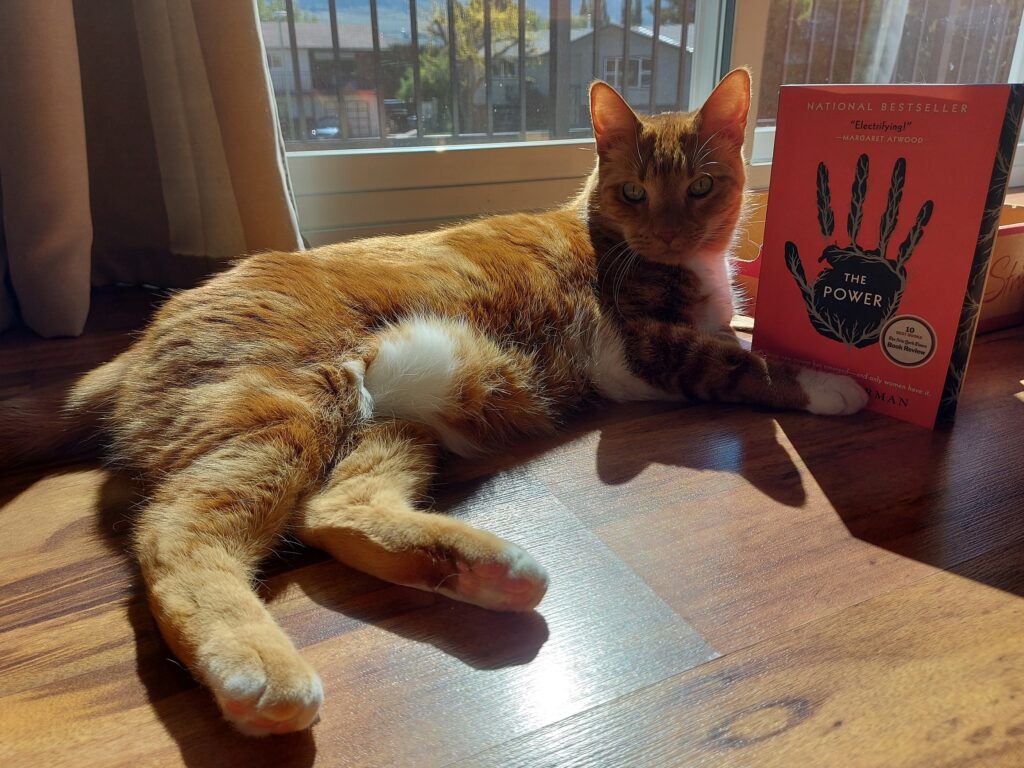The Power by Naomi Alderman

Imagine a world where women have all the power and men learn to become afraid of them; that is the premise of The Power by Naomi Alderman. In The Power, females are discovered to have the latent ability to conduct electricity and release it through their fingers. This power suddenly becomes activated in teenage girls, who can then awaken the power in older women. Women start weaponizing the power against men, and it flips the gender narrative in favour of women. But would the world be a better place if women were in control? The Power is an interesting and thought-provoking novel that posits an answer to that question that I think misandrists are going to hate.
The Power is framed as a novel-within-a-novel where the author Naomi Alderman has been given a draft of a historical novel called The Power by a writer named Neil Adam Armon (which is an anagram of Naomi Alderman) to read and critique. The key word here is “historical” because even though The Power is set in our present, it is actually (fictional) Naomi and Neil’s distant past, and they have been living in a female dominated society for several millennia.
The Power follows a few key figures: First, an English girl named Roxy whose power awakens as her mother is being murdered. Roxy’s dad is a mobster who traffics drugs; Roxy uses the power to become his right-hand man, so to speak, and becomes well respected in the crime syndicate. Next is Margot, a mayor of a Florida town, whose older daughter has difficulties managing the power and awakens the power in Margot. Margot has the idea of creating training camps for teenage girls and teaching them how to control the power, but also use it as a weapon. The girls from these training camps are eventually loaned out to the army and the UN. Margot is politically ambitious and uses the power to her advantage to become governor of Florida. Then there is Allie, a teenage girl also from Florida who is being sexually abused by her foster father. One day she uses the power to kill him and runs away. Allie hears a voice in her head that leads her to a convent that has been taking in girls who have been kicked out of their homes for having the power. At the convent, the voice in Allie’s head talks her into creating a female-centric religion based on Christianity that she becomes the leader of, and she becomes known as Mother Eve. Mother Eve uses her new religion and the power to influence people into doing what she wants. So, what do these three women have in common? None of them use the power to do good out of the kindness of their hearts, they use the power to better their own lives and to have power over others, and this leads to apocalyptic consequences.
The novel also follows a man, Tunde, who wants to be a reporter, so he travels from his home in Lagos to Saudi Arabia to cover the riots going on there as the women use the power to overthrow the government. For the next decade Tunde travels around the world to cover stories about the power. At one point he is nearly sexually assaulted by a woman wielding the power, but luckily a group of women stop her. Despite this, Tunde does not lose his sympathy towards women. He understands that women may be capable to using the power to do bad things, such as rape and murder, but they can also do good things with it. Other men, though, want women to be put back in their place (surprise, surprise) and start going to war against them and looking for ways to steal the power from them.
I cannot say that I am at all surprised that the idea presented by Naomi Alderman’s The Power is that women are really not at all better than men. Women are human after all, and it is human nature to crave power, and people with power seldom use it for good. Look at the way men have treated women, and pretty much anyone who is not white and male, for all of human history. No wonder the women in The Power want to get revenge against men. If power were used for good, then the world would not be the shitshow that it is. And that is the point of The Power: (white) men have all the power, but the world is not a good place, yet if women had all the power, the world would probably not be any better. The world is not going to be better until we humans stop thinking in terms of having power over others and start thinking in terms of how we can help each other because we are all in the same sinking boat.
There is so much in this novel that I could go on and on about, but I do not want to spoil much more, so I will stop now and just add that you should read this novel and let me know what you think of it.